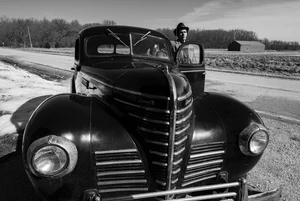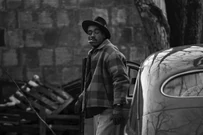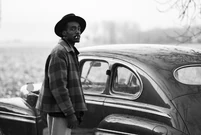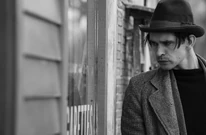| East/West | |
| Season 4, Episode 9 | |
| Episode Information | |
| Air Date: |
November 15, 2020 |
| Written by: | |
| Directed by: | |
| Episode Chronology | |
| Previous Episode: | |
| Next Episode: | |
| Crew • Gallery • Transcript | |
East/West is the ninth episode of Season 4, and the thirty-ninth episode overall. It will air on November 15, 2020.
Synopsis[]
Rabbi and Satchel hit the road.
Plot[]
The episode opens with a quote from British mathematician Bertrand Russell: "Life is nothing but a competition to be the criminal rather than the victim." In the ruins of a destroyed house, a torn-apart copy of The History of True Crime in the Midwest is face-down among the wreckage. The wind pins the first page of Chapter 7, "WHO SHOT WILLY BUPOR?", taking place in Liberal, Kansas, to a plank of wood. The shot zooms into the illustration of a black and white cornfield, and the episode stays in black and white as it transitions to the actual cornfield, following a car driving by.
The driver, Omie Sparkman, stops for a smoke and stares at a plaque commemorating Clyde Tombaugh's discovery of Pluto. When hammering sounds from the trunk, he opens it to reveal Aldo Abruzo, a Fadda Family soldier he had kidnapped for information on Constant Calamita. Abruzo explains that Calamita took firearms and said he had to kill people out in Kansas, but does not remember who the targets are. Sparkman shuts the trunk again. Sparkman later arrives at a gas station owned by an older man named Willy Bupor. He asks if he has seen a man fitting Calamita's description, but gets nothing. Bupor tells him that he owns the only gas station in the area, and will likely see Calamita at some point, and Bupor offers to let him hang around if he paints the station. Sparkman releases Abruzo from the trunk, and the two paint together as storm clouds form overhead.
While they take a break, Abruzo muses that he is all for racial equality, comparing the problem of the working man to Dr. Seuss' Yertle the Turtle, in which a king turtle forces his subjects to climb on top of each other so he can survey his domain. In it, he explains, the turtles on the bottom get crushed. Just as he starts to get to the point, a car pulls up outside and Abruzo makes a run for it, and Sparkman shoots him dead immediately. The driver exits the car, revealing it to be Calamita.
One day earlier, Rabbi Milligan and Satchel Cannon pass by the Pluto marker and Bupor's gas station. Rabbi turns on the radio and hears Senator Joe McCarthy rave about the dangers of "communistic atheism," and turns it off. They enter Liberal and pass by an unfinished billboard of a smiling man reading "The FUTURE is". They stop at the Barton Arms Hotel, which is divided into East and West by the two sisters who own the place. Rabbi and Satchel are given the West side when asked a series of questions about the country's geography, politics, and religion, Rabbi noting he prefers the New Testament to the Old because it offers the idea of being born again. As they are led to their room, Satchel notices an extremely sick man being taken care of by a boy. Rabbi gives Satchel a knife and leaves to get money he had stashed away in town.
Rabbi enters a store and finds it is no longer the feed store he knew it as. The new owner explains it was lost in a bet after World War I. Rabbi notes that a wall in the store has moved and leaves when the owner goes to take a phone call. Satchel finds a dog in the room's wardrobe, identified as "Rabbit" by the collar around her neck. He follows the dog to the hotel lounge, where he meets salesman Hunk Swindell, who tells him about the book How to Win Friends and Influence People. As another man, Hickory J. Milch, sits down to discuss financial prospects with Swindell, Rabbi returns and brings Satchel back to the room. Rabbi explains that the money he stashed has been moved, but he believes he has found a solution.
Rabbi and Satchel attend dinner with the guests and the sister owners, who argue over whether or not Satchel should be allowed to sit at the table. Rabbi says that he and Satchel are trying to make a fresh start in Sioux Falls, while Swindell tells a story of when he met a man in publishing, who claimed the story of Goldilocks was a perfect example of "an outsider in search of himself." The story has no ending, as the main character ends up back out in the cold. Satchel sleeps well with Rabbit at his side, but Rabbi finds himself restless. The next day, Satchel convinces Rabbi to let him take Rabbit along to downtown Liberal. When they drive past the billboard, Rabbi stops and asks the man working on it what it's going to say. The man tells him he will have to wait and see, as he will be jobless when he finishes putting it up.
The owners of the store argue over Rabbi's visit, the one who met him unnerved by his presence. Rabbi himself enters and pulls a gun, demanding the money he hid behind the moved wall, only to find the owners spent most of it for themselves. Knowing there is nothing he can do, Rabbi leaves. Outside, a police officer approaches Satchel, suspicious of him sitting in a car alone. As he reaches for his pistol and Rabbit starts to whine, Rabbi emerges and stops the altercation, claiming Satchel is the son of his late friend from World War II. Back at the Barton Arms, Satchel bemoans having nothing for his birthday, and Rabbi decides to get him something. He learns from the woman behind the desk that Bupor's gas station is not far, and he can likely get Satchel candy there. Before he leaves, he tells the woman to tell Satchel the following if he comes looking: instead of Rabbi's usual "if I don't come back, I'm dead or in jail," he asks her to tell Satchel "I'll be right back." Storm clouds gather in the sky.
The billboard, now finished, shows the man standing in front of a suburban neighborhood, reading "The FUTURE is NOW!" Unsatisfied, Rabbi demands the worker tell him what it means, and the worker posits that it could be a statement on the confusing nature of time, or something motivational. He summates that "they don't pay me to write 'em." He notes that he is now unemployed, and the future he feared has arrived, as predicted by the billboard. Annoyed, Rabbi leaves.
As he arrives at Bupor's gas station, he finds Bupor himself dead and Sparkman wounded, Calamita standing over him with a gun. Calamita notices Rabbi and follows him outside, shooting him in the shoulder. Sparkman shoots Calamita from behind before being shot dead, and Rabbi's gun is knocked out of his hand by a piece of debris as the winds start to pick objects up. Before Calamita can kill him, a tornado forms and sucks him up. Rabbi tries to withstand the force, but is picked up by the storm and carried into the vortex.
Satchel awakens in the room, the episode transitioning to color when he opens the door. He passes by the sick man, who quotes a Bible verse related to Noah surviving God's flood and being warned off a sinful life. Satchel decides against going into the room as the man beckons him, blocking the door with a chair and aiming one of Rabbi's revolvers at it. He falls asleep on the bed and wakes up the next morning, finding Rabbi still not back. He pockets the gun and leaves with Rabbit. He walks past a house destroyed by the tornado and stares at the billboard, now vivid with color.
Cast[]
Main cast[]
- Ben Whishaw as Patrick "Rabbi" Milligan
- Corey Hendrix as Omie Sparkman
- Gaetano Bruno as Constant Calamita
Guest Starring[]
- Rodney L. Jones III as Satchel Cannon
- Tim Hopper as Hunk Swindell
- Cedric Young as Willy Bupor
- Andrew Rothenberg as Liev Moskowitz
Co-Starring[]
- Joel Reitsma as Aldo
- Ira Amyx as Bandaged Man
- Erik Hellman as Beachwood Indiana
- Sam Hubbard as Haskell Indiana
- Japhet Balaban as Hickory J. Milch
- Patrese D. McClain as Ina Botkins
- Cordis Heard as Iola Crumb
- Linda Reiter as Picola Crumb
- Gary Houston as Seymour Hamar
- Alexa Nasatir as Millie
- Joann Montemurro as Mother Roanoke
- David Lind as Police Officer
- Karl Potthoff as Smoking Man
- Dina Facklis as Woman in Catalog Store
- Aaron Lamm as Teen Helper
Deaths[]
- Aldo Abruzo
- Willy Bupor
- Omie Sparkman
- Constant Calamita
- Patrick "Rabbi" Milligan
Trivia[]
- Unlike other episodes, except for the beginning of "Waiting for Dutch", this episode was shown mostly in black and white, only turning to full colour in the final scene. This is likely an allusion to The Wizard of Oz, the classic film which began in black and white before turning to technicolour when Dorothy is transported to Oz.
- Like Dorothy, Satchel is accompanied by a small dog (Toto in Oz, Rabbit in Fargo).
- Dorothy's famous line, "Toto, I've a feeling we're not in Kansas anymore," also relates to Satchel, who is fleeing Kansas City and has his circumstances drastically changed by a tornado.
- The two feuding sisters with their house split in half is an allusion to the Wicked Witches of the East and West, major antagonists of The Wizard of Oz.
- Hunk Swindell could be analagous to the Wizard himself, appearing helpful, charming, and wise but really being little more than a con man or swindler.





